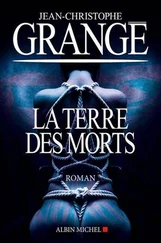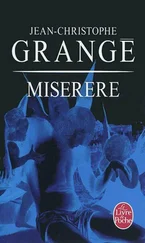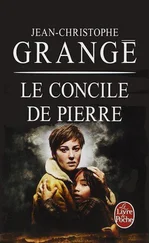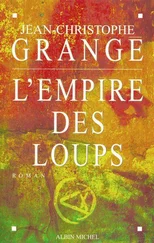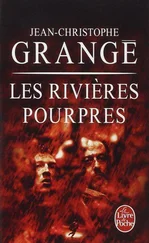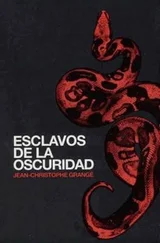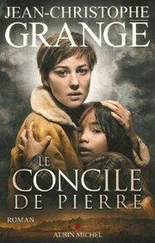Suddenly, footsteps echoed on the marble. The policeman then realised why the floors were all bare. The building had been made for people who used their ears to see. He turned round to discover a strapping man with a white beard. A sort of patriarch, with red cheeks, sleepy eyes, and a yellow cardigan. He immediately sensed that this was someone he could trust.
"I'm Dr Champelaz. I run this home," the big man declared in a bass voice. "What the hell do you want at this time of night?" Niémans handed him his tricolor card.
"Superintendent Pierre Niémans. I'm here in connection with the murders in Guernon."
"Another visit?"
"Yes, another one. The first visit you received, that of Lieutenant Eric Joisneau, is in fact precisely what I want to ask you about. I think that you must have given him some vital information."
Champelaz looked worried. The reflected raindrops made tiny rivers across his immaculate white hair. He gazed down at the handcuffs and gun on Niémans's belt. Then he raised his head.
"My God…all I did was answer his questions."
"And your answers led him to Edmond Chernecé's residence."
"Yes, of course they did. And?"
"And, they're both now dead."
"Dead? But, they can't be…That's…"
"I'm sorry, I don't have time to explain it all now. What I'd like you to do is to repeat exactly what you told him. Without knowing it, you are in possession of some very important evidence."
"But, I don't understand…"
The man stopped in his tracks. He rubbed his hands together energetically, with a mingled feeling of cold and apprehension.
"Well, in that case…I'd better wake myself up properly, hadn't I?"
"I rather think so, yes."
"Would you like some coffee?"
Niémans nodded. He followed where the patriarch led, down a corridor of high windows. Flashes of lightning momentarily lit up the air, followed by renewed semi-darkness, broken only by the serpentine pathways of the rain. The superintendent felt as though he were walking through a forest of phosphorescent creepers. On the walls facing the windows, he noticed some more drawings. This time, of landscapes. Mountains with chaotic skylines. Streams sketched in with pastels. Huge animals, with coarse scales and overly numerous vertebrae, which seemed to come from an age of stone, an age of monsters when mankind was the size of a mouse.
"I thought that your center was only for blind children."
The director turned round and joined him.
"Not only. We treat all sorts of different eye conditions."
"For example?"
"Pigmentary retinitis. Color blindness…"
The man pointed a powerful finger at the pictures.
"These images are peculiar. The children here do not see reality in the same way we do, nor even their own drawings, for that matter. The truth – their truth – lies neither in the real landscape, nor on the paper. It is in their minds. They alone know what they wanted to express, and we can get but a glimpse of it, through their artwork and through our normal vision. Rather disturbing, don't you think?"
Niémans gestured vaguely. He could not take his eyes off those strange drawings. With their broken contours, as though crushed by some heavier matter. Their shrill, vivid colors. Like a battlefield of lines and shades, but which also gave off a feeling of gentleness, an echo of ancient nursery rhymes.
The man slapped him on the back.
"Come on. Some coffee will do you good. You look all in."
They entered a large kitchen. The furnishings and utensils were all made of stainless steel. The gleaming walls reminded Niémans of a morgue or a death chamber.
The director poured out two mugs of coffee from a round shiny pot, which was heated permanently. He handed one to the policeman then sat down at a stainless steel table. Once again, Niémans thought of bodies during an autopsy, the faces of Caillois and of Sertys. Their dark, empty eye-sockets, like black holes in space-time.
Champelaz declared in astonishment:
"I just cannot believe what you told me…Those two men are both dead? But how?"
Pierre Niémans ducked the question.
"What did you tell Joisneau?"
Stirring the coffee in his mug, the doctor shrugged.
"He asked me about the conditions we treat here. I explained that they are generally hereditary diseases, and that most of my patients come from the families in Guernon."
"Did he ask you anything in particular?"
"Yes. He wanted to know how such diseases are contracted. I gave him a brief explanation of how recessive genes work."
"Which is?"
The director sighed, then calmly went on:
"It's quite simple. Certain genes carry diseases. They are defects, spelling mistakes in the system. We all have them, but fortunately not in sufficient quantity to trigger off such a condition. But, if both parents have the same gene, then things can start to go wrong and their children can contract the affliction. The genes merge together and transmit the disease, rather like a plug and a socket which allow the current to flow through, you follow me? That is why we say that inbreeding weakens the blood. It's an expression which means that two closely related parents have a high chance of passing a latent disease, which they both carry, on to their children."
Chernecé had already mentioned that fact. Niémans pressed on:
"So the hereditary diseases in Guernon are down to inbreeding?"
"Definitely. Many of the children we look after here, either as in-patients or out-patients, come from that town. And in particular from the families of lecturers and researchers at the university. It's an elite society, and hence extremely isolated."
"Sorry, could you be more precise?"
Champelaz crossed his arms and held forth.
"There is an extremely ancient university tradition in Guernon. The college dates back to the eighteenth century, I believe, and was set up in conjunction with the Swiss. In the past, it was in what is now the hospital…Anyway, for almost three centuries, the university teachers and researchers have been living on the campus and marrying one another. They produced several lines of highly gifted thinkers, but now their inheritance is genetically exhausted. Guernon was already cut off, like all towns lost in the bottoms of valleys. But the university created a sort of isolation within that isolation, you follow me? A true microcosm."
"And that isolation is enough to explain the outbreak of genetic diseases?"
"Yes, I think so."
Niémans failed to see how this information might be of importance. "What else did you tell Joisneau?"
Champelaz tilted his head, then declared in his booming voice: "I also told him about a particular point of interest. Something rather odd."
"What's that?"
"Over the last generation, families with this weakened blood have been producing radically different children. They are intellectually brilliant, but they are also possessed of an inexplicable physical strength. Most of them win all the sports competitions while at the same time gaining the highest academic distinctions."
Niémans remembered the portraits in the vice-chancellor's antechamber, young radiant champions carrying off all the cups and medals. He also recalled the photographs of the Berlin Olympics and Caillois's door-stopper about the good old days of Olympia. Could all of these elements really fit together into the overall design?
Playing dumb, the 'policeman asked again:
"You mean, all of those children should really be sick?"
"It's not that straightforward, but it must be said that they should have weak constitutions and suffer from recursive conditions, like the children in this home. But they don't. On the contrary, it is as if these little supermen had made off with the entire community's genetic wealth and left all its genetic poverty to the others" Champelaz glanced awkwardly at Niémans. "You're not drinking your coffee."
Читать дальше

